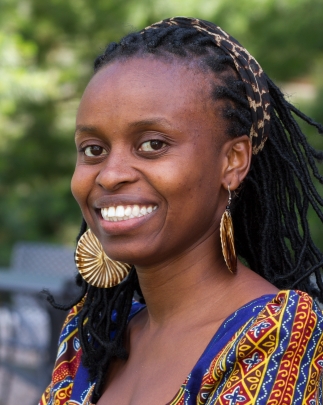Menu
- Public Policy
- Leadership
- Funding
- News & Events
- About the Center
Back to Top Nav
Back to Top Nav
Back to Top Nav
Back to Top Nav
This is part of an ongoing series of articles on the Rockefeller Center's participation in the Young African Leaders Initiative, or YALI.
Inspired by her own struggles, Hyasintha Ntuyeko devised a solution that has helped her entire community. Working as a telecom engineer in Tanzania, Hyasintha noticed the stigma surrounding menstruation. Humiliation led many girls to stay at home for however many days their periods lasted. These girls would miss school and sometime not even finish their education. Not having an education would put them in conditions where they would depend on men for sustenance, leaving many women unhappy. On top of this, girls who suffered from menstruation issues or experienced excessive levels of pain were too embarrassed to address their health problems.
 |
Immediately after completing her university education, Hyasintha invested her time into research, looking for a solution to the difficulties women in her community faced everyday. She became founder and managing director of Kasole Secrets, a company dedicated to providing women with affordable, organic sanitary napkins.
Her passion for approaching women’s menstruation problems ignited controversy within her community. No one understood why she openly spoke about something otherwise considered taboo. The disapproval escalated to unimaginable heights.
“My mother invited Catholic priests to speak to me,” says Hyasintha. “She believed I was possessed by evil spirits. When I would not let the priests touch me, they saw this as proof of my possession.”
Hyasintha’s dreams led her to move away from home. She did not want her products to be chemically processed at all, particularly because she did not want to add to the health issues these women already faced. Ultimately, her persistence helped her discover a bamboo plant with revolutionary benefits in reproductive health. She decided to make her company’s pads from this material; however, no factory in her country met her criteria, so she looked to every other country until she finally found a reliable resource.
“Women trust me.” says Hyasintha. “I would never use material for their pads if I didn’t understand where it came from.”
Today, Hyasintha aims not only to continue the production of sanitary napkins, but to also break taboos. She aims to make her entire community aware of menstrual hygiene regimens and how women struggle to fulfill these regimens without facing humiliation. She particularly stresses engaging men and boys in her cause because if, in her community, the father or husband is the provider, he needs to understand his wife and daughters’ problems.
Hyasintha initiated the Hedhi Salama (“safe menstruation”) campaign and promoted the celebration of International Menstrual Hygiene Day in Tanzania. Taking what she has learned from her Mandela Washington Fellowship, Hyasintha hopes to continue to expand health education opportunities across Tanzania and spread her campaign for better menstrual conditions.
-Written by Nikita Bakhru '17, Rockefeller Center Student Program Assistant.